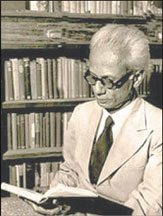|
Martin Wickremasinghe:
Re-reading M.W.'s Leela
by Kalakeerthi Edwin Ariyadasa
"Didacticism is a philosophy that emphasised instructional and
informative qualities in literature and other types of art. This term
has its origin in the Ancient Greek word didaktikos, "related to
education and teaching," and signified learning in a fascinating and
intriguing manner."As things are, in any worthwhile discourse on Sinhala
fiction, Martin Wickremasinghe invariably assumes centre-stage. His
claim to this exalted stature is undisputed. The history of Sri Lanka's
literary progress has conferred upon him this unassailed niche, by
virtue of the unparalleled oeuvre of short and long fiction, he has so
admirably bequeathed upon us.
|

Martin Wickremasinghe |
 For a good part of the 20th century, he continued to produce a
plethora of Sinhala fiction, characterised by a consummate professional
discipline and an ever-burgeoning creative skill. For a good part of the 20th century, he continued to produce a
plethora of Sinhala fiction, characterised by a consummate professional
discipline and an ever-burgeoning creative skill.
As he developed into a mature writer of fiction, scaling the higher
peaks of craftsmanship, he refined his style into fictionalised realism.
Aspects of far-reaching social change, that profoundly affect the way of
life of the masses, caught up in the grope of transformations, brought
on by the relentless march of time, formed the staple idiom of his main
fictional presentations.
His classical trilogy, consisting of the three inter-linked works of
fiction - Gamperaliya (the changing village), Yugantaya (the end of an
era) and Kaliyugaya (the topsy-turvy world) enjoys a deference, akin to
that accorded to a national chronicle.
Many of the moderns, who enthuse over the glorious achievement of
Martin Wickremasinghe - the fiction writer par-excellence, are moved by
his peak products.
The Martin Wickremasinghe Trust, delivers an overwhelming surprise,
to that class of reader, by its latest publication (re-publication to be
exact).
The trust has re-published the work of fiction titled Leela, which
initially appeared nearly a centuary ago - in 1914. Leela is Martin
Wickremasinghe's fiction debut. It is proper to categorise his creation
as a novella - or a short novel.
The slim volume, assumes a highly significant place, in the history
of Sri Lanka's Sinhala fiction.
For anyone who is keen to make an in-depth study of the evolution of
Martin Wickremasinghe's fiction, this little book is quite an
interesting publication.
Romantic novel
Its format is that of a romantic novel. The central character in the
book is Leela, a beautiful young woman, in a rural middle-class family.
A reader of our time, making an effort to read this book will be
impressed by its quaint narration.
Its story line is simple, to the level of being naive.
The patina of age, imparts to this work a special flavour, as its
archaic appeal exudes a strange shift of freshness, for the contemporary
reader, to whom this novel seems to bring news of a era that is totally
gone.
In his preface to the work, Author Martin Wickremasinghe makes it
quite clear, that the central purpose of this novel is to disseminate
knowledge about certain concepts, which were revolutionary at that time.
He assures the reader that, his intention was to write in the demotic
idiom, without contaminating the lively expression of the rural folk,
through a preoccupation to be grammatical prim.
Didactic sermon
This has converted this fiction - essay into a didactic sermon at
times. The work opens with a lengthy statement about the superstitions
ways of the ordinary people.The episodes in this work of fiction seem to
be mere references, in total contrast to the detailed character audies
and elaborate elucidations that take up much space in long fiction of
our day.Lengthy quotations from classics, punctuate the narration.Leela
has a high significance as a bench mark creation, against which the
exceptionally sophisticated fiction of the author, could be assessed. It
enables the reader to marvel at the vast distance, Martin
Wickremasinghe's fiction has travelled in subsequent years, enabling him
to acquire a name, that sends out resonances beyond our shores.
Reformistic urges
In this piece of writing, the philosophic and reformistic urges are
abundantly present. This may perhaps be the outcome of Piyadasa
Sirsena's thoughts and works, that influenced the young mind of the
author of Leela.
What will surprise a reader is the avidity the young author displays,
in registering his wide reading. A highlight in Leela is the sustained
polemical discussion, in a train, between two pandits, with the
passengers as the spell-bound audience.The character of Leela, has been
recorded, as a model Sinhala woman who is a product of all the virtues,
that were esteemed in that social context.The leading male character
pays an instinted tribute to Leela, for her unperturbed ways and her
exemplary capacity to remain unruffled even under the most exacting of
circumstances.We must record our gratitude to the Martin Wickremasinghe
Trust, for this re-issue of the Author's first novel.This will enable
many, to view Wickremasinghe's creative pilgrimage in an entirely new
perspective.The publication itself has a compelling dainty touch,
echoing the marked feminism of the total character.
Those who read this little work of fiction Leela, will no doubt,
marvel at the evolution of the creative talents of the author from this
novella to the epic trilogy.Once again, Leela enhances the author's
creative triumph, by providing the reader an opportunity to assess the
discipline, he has assiduously cultivated to effect the transition from
Leela to Kaliyugaya.
|


